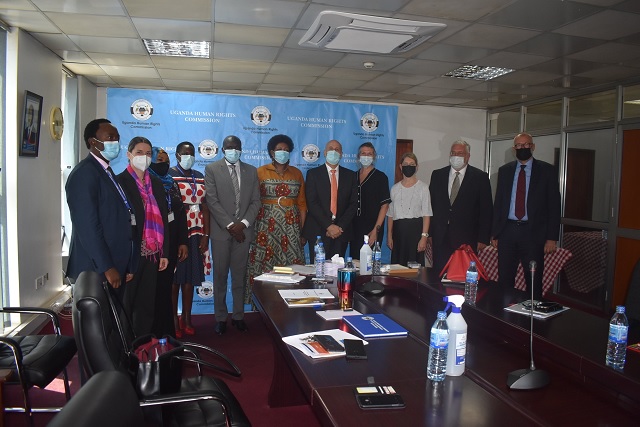
Kampala, Uganda | THE INDEPENDENT | The Uganda Human Rights Commission is unable to perform some of its core functions since the suspension of the Democratic Governance Facility-DGF.
The commission is one of the entities that initially received funding from DGF, the single biggest donor basket established by development partners to provide harmonised and well-coordinated support to state and non-state entities in Uganda. Its funding targeted activities that sought to strengthen democratization, protect human rights, improve access to justice and enhance accountability in Uganda.
But the fund was suspended early this year, over what President Yoweri Museveni called an affront on the sovereignty of the country. According to President Museveni, the Ministry of Finance irregularly and unilaterally authorized DGF funding, to a tune of 500 billion Shillings, to be operated exclusively by foreign missions in Uganda. He says that the approval of DGF operations without government oversight, is tantamount to surrendering the sovereignty of the people of Uganda to foreign interests.
The chairperson of the Uganda Human Rights Commission Mariam Wangadya, said that the work of the commission is equally paralysed. She was speaking after a closed-door meeting with Ambassadors from six European Union countries, who called upon the commission to impress it upon the government to have the fund reopened.
The team led by the EU Head of Delegation Attilio Pacifici had the envoys from Austria, Netherlands, Belgium, Sweden, Germany and Denmark, who pointed out that the continued closure of the fund affects none other than the people of Uganda who were its primary beneficiaries. Speaking to the press after the meeting, Wangadya said UHRC investigations, tribunals, field offices and civic education activities are now paralysed.
Wangadya also said that the EU is uncomfortable with the continued closure of schools. President Museveni in March last year, as a measure to counter the spread of COVID-19, ordered for the countywide closure of all educational institutions.
“It’s their wish that schools be reopened; they said we have the capacity to reopen schools because now we have vaccines some of which have been donated by their countries. They think that the continued closure of schools is going to affect the future of children because they have spent now two years at home,” Wangadya said.
Meanwhile, the Uganda Human Rights Commission has said it doesn’t know why the country is getting worked up by the proposal to scrap bail and bond for capital offence suspects. Wangadya said although this particular issue wasn’t discussed with the EU ambassadors, nonetheless, she thinks bail should be left to the discretionary of the judges.
Last week, news reports indicated that the cabinet had debated and passed proposals by the president to scrap police bond and court bail at least for six months for anybody accused of committing a capital offence. The proposal has not only rattled opposition politicians and activists, but also some NRM MPs who see it as an affront to the powers of the judiciary. What is left to be seen is whether the cabinet pushes through with the amendments and whether actually MPs can turn around and pass the law which some have already described as draconian.
*****
URN
 The Independent Uganda: You get the Truth we Pay the Price
The Independent Uganda: You get the Truth we Pay the Price




With all due respect, the EU pressing for allowing the DGF to reoperate without taking into account the issues raised by the H.E. is very unequal.
Also pressing for the reopening of schools through other NGOs ather than enganging the MOES tantamounts to sowing discord and division.